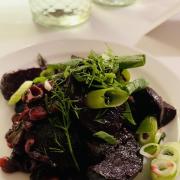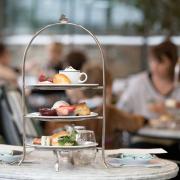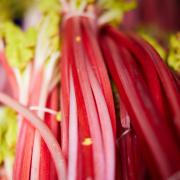Some of the nation’s biggest food brands hail from Yorkshire, and yet the history of some our favourite foodstuffs are relatively unknown outside the county. Here’s our pick and mix of local entrepreneurs and food innovators.

Seabrook Crisps
When you think of pickled onion crisps, most people would immediately think of Monster Munch, and when you mention crinkle cut crisps in the North, the name Seabrook is the most likely association they will make.
Founded in Allerton near Bradford by fish and chip shop owner, Charles Brook (C Brook) in 1945; the company was famously named due to a clerical error that stated the company as Seabrook.

Party Rings
The height of fashion in the 80’s and a staple of kid’s birthday parties across the country, Party Rings were introduced by Batley based Fox’s Biscuits in 1983.
The Fox family founded the company from a terrace house in Whitaker Street in 1853 and is the creator of national favourites such as Rocky Bars, Sports biscuits and Crunch Creams.

Jelly Babies
Although baby shaped confectionery was in production from the mid 1860’s, the iconic Jelly Babies as we now know them were originally produced by Bassetts in 1918 and were named ‘Peace Babies’ to commemorate the end of the First World War.
Founded in Sheffield by George Bassett in 1853, the company’s other famous brand is the Licqourice Allsorts range, and those of a certain age will remember the Bertie Bassett mascot from various adverts down the years.

Tetley Tea
The Tetley brother’s from Bradford started selling tea in Yorkshire in the 1800’s before moving their business close the tea auction rooms in London, which at the time was the tea trading capital of the world.
The company has gone onto become the world’s second largest manufacturer and distributor of tea and can boast of many ground breaking inventions after first introducing the regular tea bag to Britain in the 1950’s, and also developing round shaped and drawstring teabags.
Although Tetley’s time in Yorkshire was brief the company has doffed a flat cap to it’s northern roots with its long-standing and very popular ‘Tetley Tea Folk’ animated characters as part of their advertising campaigns.

Henderson’s Relish
Created in Broad Lane, Sheffield by Henry Henderson over 130 years ago, Henderson’s Relish hit the headlines in 2014 when a London MP mistakenly labelled it as a brand imitation of Lea and Perrin’s Worcestershire Sauce.
Although it can count Sean Bean, Marco Pierre White and the Arctic Monkeys among its celebrity fans, most people outside Yorkshire (or even Sheffield) have probably never heard of Hendos but it remains a local iconic brand.

Smarties and Kit-Kat
Henry Isaac Rowntree founded his confectionery company in York in 1864 and the Rowntree brand went onto create some of Britain’s most much loved brands including Fruit Pastilles and After Eight.
Smarties first originated in 1882 as Chocolate Beans and Kit-Kat was originally launched in 1935 as Rowntree’s Chocolate Crisp, it is one of the UK’s biggest selling chocolate bars, partly due to one its most famous slogans, ‘Have a break, have a Kit-Kat.’ Although the York factory (now owned by Nestle) no longer produces Smarties, it does produce over 1 billion Kit-Kats a year.

Polo
Another creation by Rowntree, the Polo is Britain’s biggest selling mint, and is probably one of the most recognisable food items in Britain since its launch just after the Second World War.
It is no wonder that the long standing advertising slogan for Polos has simply been ‘The mint with the hole’, it really needs no other introduction.
According to figures 38 million Polo mints are produced every day and an average of one hundred and fifty Polos eaten every second!

John Smiths
Yorkshire has a rich brewing heritage and can list names such as Thwaites, Tetley and Stones Bitter as national household brands, however it is John Smiths that is probably the most well known across the country due to advertising campaigns starring comedians Jack Dee and Peter Kay, and past sponsorship of the Grand National. The high profile marketing has paid off as John Smith’s has been the highest selling ale brand in the UK for over 20 years.
The company can trace its history as far back as 1758 and the brewery site in Tadcaster is still used to manufacture beer, despite a succession of different owners and parent companies over the years.

Chocolate Orange
Fictional TV Star Alan Partridge is a big fan of the Terry’s Chocolate Orange, so much so that he gladly gifted his radio show listeners and associates with ‘shop-soiled’ chocolate spherical treats.
A little known fact is that Terry’s also created short-lived versions of chocolate apples and lemons, but the orange has had outlasted them all since its introduction in 1931, with many different incarnations including a bar form and a popping candy version.
Although production at the beautiful Art Deco Chocolate Works in York ceased over a decade ago, the Chocolate orange remains a national favourite.

Yorkshire Tea and Taylor’s Coffee.
Yes, of course they are from Yorkshire, the clue’s in the name.
Many people outside of Yorkshire may not have heard of the much loved Betty’s Tea Rooms, but most of the nation will recognise Yorkshire Tea as well as the Taylor’s of Harrogate coffee brand that are available across the UK.
Taylor’s of Harrogate was originally a family tea and coffee merchant company that was founded in 1886 by Charles Edward Taylor and his two sons.
With all these iconic brands it’s also no surprise that Yorkshire is a major player in the industry that sells all these products, did you know two of the ‘Big 4’ supermarkets originated in and still have their UK head offices in Yorkshire?
ASDA can trace its history back to a group of Yorkshire farmers who formed a dairy company in the 1920’s, through various mergers throughout the following 50 years, the supermarket chain established itself in the 1970s and now has over 500 stores in the UK.
Despite being bought by US retail giant Walmart in 1999, the ASDA head office is still based in Leeds.
Morrisons started out in 1899 as an egg and butter stall in Bradford’s Rawson Market, in 20 years William Morrison went onto open a handful of stores in surrounding towns. By the 1960s the company had opened its first supermarket, a 5,000sq ft converted cinema and in the present day has over 500 superstores nationwide.
The head office is still based in Bradford, making it the largest public company headquartered in Yorkshire. The current Life President is Sir Ken Morrison, William’s youngest son who was the chairman for over 50 years.
Marks and Spencer can also trace its roots back to West Yorkshire, back in 1894 Michael Marks a market trader in Kirkgate Market in Leeds joined forces with Tim Spencer to to set up a chain of stores called ‘Penny Baazars’.
The company went on to become a British icon and although the head office is now in London, the company still acknowledges its Yorkshire roots, the M&S Company Archive which houses over 70,000 items from the company’s history is based in the University of Leeds camous and during the Marks & Spencer Centenary Year in 1984 a commemorative clock was unveiled at Kirkgate Market to stand as a monument to 100 years of M&S.



























